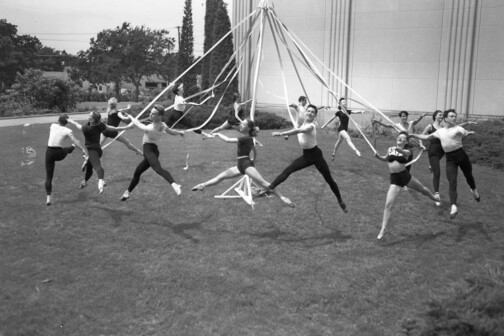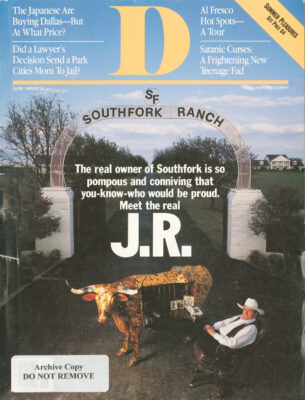Once upon a time, Wall Street meant business-sophisticated, fast-lane finance. And working for a Wall Street firm was top of the heap. These days, however, talk of Wall Street brings to mind a different sort of heap-with players corrupt enough for a Dickens novel. Milkenesque characters wickedly laugh behind the backs of ignorant, out-of-the-loop investors, gritty young brokers hungry for commissions chum accounts, and the list of the indicted and disgraced grows to mob proportions. A distorted picture, yes, but with roots in true stories.
You can bet that’s the way Dal-lasite M.K. “Pete” Peterson sees the stock market these days. Peterson is in the heat of a dispute with his old stock brokerage firm, Dallas-based Rauscher Pierce Refsnes; his former friend and broker, Richard Juba; and the New York Stock Exchange over an investment strategy that fell flat on October 19, 1987, and left Peterson bemoaning $1.5 million in losses.
Peterson is just one of 4.100 investors who filed securities arbitration claims in 1987-a radical increase from the 800 who filed such claims in 1980. And though many of the disputes stem from losses incuned on Black Monday fsays one longtime broker, “No one has a problem as long as everyone is making money”), others result from intensified scrutiny of a market that investors say is dominated by institutions and insiders.
Peterson describes his debacle as a “tragic betrayal by a friend,” wherein Juba recommended a highly speculative strategy that exposed Peterson’s entire net worth to the risk of loss while making Juba fat commissions. Peterson also says that Juba (ailed repeatedly to take him out of this “bet the ranch” position when asked to do so, leaving Peterson exposed with the crash. But Juba and his firm say that Peterson is a riverboat gambler who was fully aware of his risk.
Peterson’s case illustrates why the arbitration process is under attack these days. More and more often, arbitration cases are ending up in court anyway when one side or the other doesn’t like the arbitrators’ decision.
Of course, the logical solution is to take steps to prevent such misunderstandings before they lead to losses and, in the rare case of an October 19, to absolute disaster. Most Wall Street watchers say that fears of systemic illegality in the securities markets are overblown, that a few brokers have tainted a largely honest industry. But it still pays to be a “professional” client-one who makes sure, through careful monitoring, that the broker works for you. In this post-trauma stock market, you had better make sure you …
● Know your broker and make sure he or she knows you. Communication is as important in business relationships as it is in a personal relationship, so make sure you are familiar with your broker’s investment tendencies. Is he or she more conservative than you are? A bigger risk taker? Is your broker aware of your own investment philosophies?
● Be wary of a broker whomakes too many promises ormakes any investment sound likea sure deal. Remember, this islargely a verbal business, andthere are no guarantees. Becauseof the increase in arbitrationcases, specifically the ones wherebrokers are trying to collect fromclients, many brokers have turnedto devices that record phone conversations. In Texas it is legal totape conversations as long as oneparty knows about it, so you maywant to tape the orders you giveyour broker.
● Know your brokerage firm,too. What is its reputation? Is itknown for shortselling, being hotin the options market, or as a conservative Blue Chip watcher? You’re better off at a firm where the approach to the market matches your own philosophy If you have a small account with a broker at a firm known for trading for big hitters, chances are you won’t get much attention.
●Know your investment. You don’t have tobe as knowledgeable about investments asyour broker, but if you get into a deal that youdon’t understand, chances are you won’t becomfortable with it for long. Don’t hesitateto ask for an explanation in writing.
●Remember, this is both a commission-and performance-oriented business. Yourbroker gets paid for buying and selling, andthough it is the exception, some brokers whohave discretionary trading power do “churn”accounts. Think long and hard before givingaway your power to say yes and no to eachtrade. If you want to stay out of your ownmoney management and leave the driving tothem, try a more static investment like ano-load mutual fund that will cut out anyincentive to churn. And if your broker’s suggestions keep tailing flat, you always havethe option to move on down the road.
●Reconcile your monthly brokerage statement just as you would your bank statementand carefully watch your trade confirmations. This business ceases to be verbal aftertwenty-four hours, at which point you are entitled to written confirmation. Don’t tossthose confirmations: take advantage of theopportunity they give you to monitor your broker’s actions. If you find problems, follow up in writing immediately. The statements are assumed to be correct, sometimes within two weeks, unless you say otherwise.
●If you trade on borrowed money, readyour margin agreement carefully and keep inmind that your firm has the right to sell youout if you can’t make margin calls. If you areplanning to be out of town and out of reach,also plan for the unspeakable-another October 19. Make sure there is enough collateral in your account to handle a big dropin stock price.
●If your broker does something that youdon’t like, fix it immediately. Once youbecome aware of a problem, any furtherlosses are your responsibility. Then changebrokers and change firms. If the manager islax enough to let a broker get away withsnafus or ethical lapses, that’s a reflection onthe whole office.
If you do find yourself locked in arbitration, there are some rules there, too. Many investors complain that the arbitration deck is stacked in favor of the industry, not the investor. For starters, you can request-when you sign a brokerage firm’s basic agreement-that any dispute go before the American Arbitration Association, which most plaintiffs’ lawyers agree is fairer than the various securities industry-sponsored forums.
Arbitration does work relatively quickly and it’s an informal process. Still, get a lawyer. You can bet your broker will have one. Pete Peterson’s sure did.
Peterson’s experience with arbitration is fairly typical of disgruntled investors. He began with a big position in the market- 52,000 shares of Sun Oil stock. Using broker Dick Juba, Peterson sold 520 call options (of 100 shares of stock each)-a somewhat conservative move called a “covered call.” By selling the call options, Peterson made money immediately (a “premium”), but he obligated himself to sell his stock if the price went up. If the stock didn’t go up-as Peterson was betting it wouldn’t-then Peterson got to keep the premium when the options expired. And since he already owned the stock, if the price did go up he could simply sell it-for a profit.
In January of 1987, the price of Sun did go up. but Peterson, for tax reasons, didn’t want to deliver his 52.000 shares and make a profit. So, electing to “lose” some $500,000, he bought back those call options himself.
In April of 1987, Peterson says, Juba proposed a complicated set of transactions that would help him recoup those January losses. He then sold 520 put contracts on Sun, the opposite of a call option, obligating Peterson to buy another 52,000 shares of the stock at $65 a share, if the holders exercised their puts, for a total of nearly $3 million if the price went down. If the price didn’t go down, as Peterson now hoped, he would get to keep a fat premium when the put options expired.
Peterson claims that the move was to be just the first step of a “straddle” that would enable him to recoup his January loss. Peterson says that not only did his friend Juba not complete the straddle, but that Juba refused to close out those puts when Peterson decided that the position was too risky.
Peterson and Juba were haggling over that order when October 19 slipped up and Peterson, like so many others, lost big.
Rauscher Pierce maintains, however, that Peterson knew exactly what he was doing, that he was quite experienced in the options market and had made similar highly speculative transactions as early as 1977 with another firm-a relationship that had also ended in arbitration.
Rauscher’s position is well documented. Peterson had signed a lengthy options agreement that spelled out the risks involved. Bruce Collins, Rauscher’s lawyer in the Peterson case, claims that Peterson never gave a direct order to close out that put position. Instead, Collins says that Peterson told Juba to buy back those puts and sell some more calls when the spread on the two transactions was such that the net gain killed the put obligation and made up that loss of the previous January. It was no simple order to fill. And Juba did not fill it, since the spread never reached that magical point.
In September and early October, as the price of the stock dropped and Pete Peterson’s obligations to buy back those puts mounted, Rauscher Pierce made margin calls to maintain the federally required ratio of debt to equity in Peterson’s account. Peterson met the first margin call-late in the week before October 19-with $80,000. Then on October 19, Peterson disappeared, having decided any further losses were Juba’s problem, Collins says. Richard Juba, unable to reach Peterson by phone, sent a registered letter to Peterson spelling out his risk. Later that week Rauscher loaned Peterson’s account money, using his 52.000 shares of Sun Oil as collateral, and made those margin calls for him.
Early on in arbitration, Peterson sawthings going against him. So he packed uphis marbles and went home. Then he tookthe dispute to court-and, after hiring apublicist, to the press. Now he wants to tryhis luck with a jury.
Related Articles

Visual Arts
Raychael Stine’s Technicolor Return to Dallas
The painter's exhibition at Cris Worley Fine Arts is a reflection of her training at UTD—and of Dallas' golden period of art.
By Richard Patterson

Dallas History
Tales from the Dallas History Archives: Scenes from 1949, When the Mob Ruled Dallas
In 1949, streetcars still roamed Dallas' streets, the Adolphus Hotel towered over its neighbors downtown, the State Fair was still segregated, and Benny Binion wanted his money.

Business
Executive Travel: Beverly Hills, California
The Maybourne Beverly Hills is a luxurious home base to explore the best of Los Angeles, a frequent destination of Alto CEO Will Coleman.
By Will Maddox


